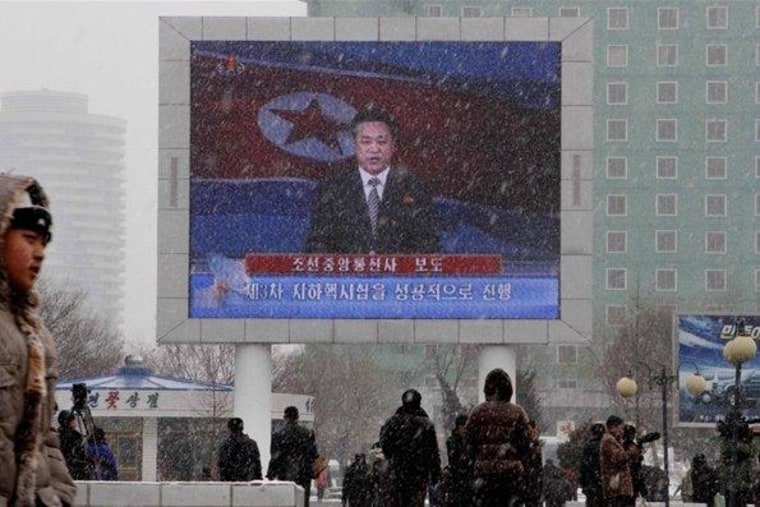If North Korea hoped to get the world's attention, it succeeded.
North Korea confirmed on Tuesday that it had conducted its third, long-threatened nuclear test, according to the official KCNA news service, posing a new challenge for the Obama administration in its effort to keep the country from becoming a full-fledged nuclear power.The KCNA said it used a "miniaturized and lighter nuclear device with greater explosive force than previously" and that the test "did not pose any negative impact on the surrounding ecological environment."
The test, reportedly more powerful than North Korea's first two nuclear blasts, was the first since Kim Jong-un became the country's new leader.
It also drew the immediate ire of international community, and the United Nations Security Council will meet in about an hour for an emergency meeting. Presumably, sanctions will be a major topic of conversation, though it's not clear what more the Security Council can do -- sweeping sanctions were already recently tightened and the country is already a global pariah. Unless China is prepared to cut off trade with North Korea altogether, the international community's options appear limited.
As for China, which had urged North Korea not to do this, and which expressed its "staunch opposition" to this latest nuclear test, it's unclear how Chinese officials will respond at the Security Council meeting, though chances are, they are not at all pleased. Andrei Lankov, a veteran analyst of North Korea based in Seoul's Kookmin Unversity, said China "explicitly warned North Korea against conducting the test, but they were ignored."
North Korea's defiance comes against a backdrop in which the country's leaders appear eager, if not desperate, to use the threat of nuclear weapons to normalize relations with foreign adversaries. It's a bizarre pattern to watch -- North Korea wants to be taken seriously, so it antagonizes the world and ignores international sanctions. This, in turn, fuels global animosity towards the country, which North Korean officials interpret as a sign they need to antagonize its rivals even more. The cycle just keeps repeating and reinforcing itself, with no evidence that it's likely to end anytime soon.
The timing of this new nuclear test is open to some interpretation, but it's not lost on the Obama administration that it comes the same day the president is set to deliver his State of the Union address.
In a statement, President Barack Obama described the test as a "highly provocative act." He said that -- following a "ballistic missile launch" by North Korea on Dec. 12 -- the test "undermines regional stability, violates North Korea's obligations under numerous United Nations Security Council resolutions, contravenes its [international] commitments … and increases the risk of proliferation.""North Korea's nuclear weapons and ballistic missile programs constitute a threat to U.S. national security and to international peace and security," Obama said. "The United States remains vigilant in the face of North Korean provocations and steadfast in our defense commitments to allies in the region."He said North Korea's "provocations do not make North Korea more secure" and the communist state had "increasingly isolated and impoverished its people through its ill-advised pursuit of weapons of mass destruction and their means of delivery.""The danger posed by North Korea's threatening activities warrants further swift and credible action by the international community," Obama said, saying the U.S. would work with the international community to "pursue firm action."
